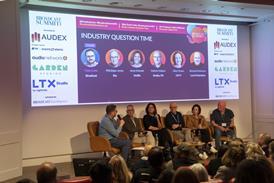 Sponsored content
Sponsored content
By borrowing the best attributes of Victorian Britain, TV can build a regional industry that benefits all, says Ruth Pitt
The burgeoning screen sector outside London – bear with me here – borrows many of its characteristics from Victorian Britain. Hopefully not the bits that involved pressing small children to work as chimney sweeps or forcing women into life-sapping corsets, but the sense of growth and optimism that transformed our great cities into engine rooms for new industry 150 years ago.
Today the talk is of breathtaking locations, levelling up, clean-growth jobs and creative industries. Council leaders speak fondly of immersive screen technologies, while regional screen agencies woo Hollywood icons and global streamers.
Who would have thought it even 10 years ago? Certainly not me, as I weathered the weekly commute from my home in Yorkshire to the honeypot of screen jobs still stubbornly located in central London.
Regeneration benefits
The role that film, TV and digital media are now playing in regeneration plans across the UK is undisputed, as economists and investors grasp the inherent benefits of thriving screen ecologies, much like Victorian industrialists understood the principles and impact of mass production.
Mercifully, making screen content is not like making mattresses – at least, I hope it isn’t. Admittedly, some of our most addictive content is honed from off-the-peg formats that endlessly replicate the same formula for success, but it still takes individual ingenuity, creative flair and organisational expertise to make every film, TV mini-series or returnable brand on the planet.
Those skills don’t pop up overnight like mushrooms in the morning dew. The people flocking into MediaCityUK in Salford aren’t the same as the flat-capped Victorian factory workers flooding through the gates of chimneyed mills and warehouses, because almost every one of them has a job that’s unique.
Unlike weaving textiles or producing the perfect fire grate, the trick of making great screen content lies in the points of difference, rather than similarity.
“The screen sector gives the country’s diverse communities an actual voice”
It’s fantastic to see broadcasters, streamers, producers, private investors and public sector bodies pouring millions into the strategic and infrastructure development of the screen sector outside London, not just because it provides people with interesting and, hopefully, sustainable jobs, but because, by its nature, the screen sector gives the country’s unbelievably diverse communities an actual voice.
Some areas of comparison between the Industrial Revolution and today’s screen industries are less compelling, however. In Victorian Britain, mill owners grew obscenely rich while their employees endured grinding poverty and hunger. It’s ironic that those amazing Victorian houses and factories, now settings for period drama, were built on the blood and toil of the poor.
So let’s learn a few lessons from history, because the Victorian leaders who really changed the game were those who constructed decent housing for their workers, built schools, made parks, invested in modern technologies and innovated to create opportunities for growth.
The holders of today’s purse-strings must invest heavily in local talent and long-term commissions alongside creating the studios and production spaces of tomorrow.

Tackling The Talent Challenge will be the theme of the Creative Cities Convention on 28-29 April, when we visit the incredible creative magnet of Digbeth in Birmingham, where soon every kind of global show, from Peaky Blinders the movie to MasterChef, will emerge from the ashes of recent industrial decline.
Similar rebirths have happened already in Glasgow, Manchester, Bristol and Cardiff – and regions like the North East, grievously neglected by successive governments for decades, are hot on their heels. Let’s invest properly in talent and make sure we take the best from the Victorians and not the worst.
- Ruth Pitt is a media consultant and director of the Creative Cities Convention



























